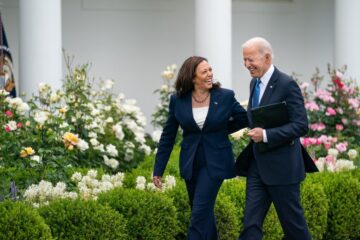Welcome back to Week 58 of my weekly reports analyzing the Covid-19 pandemic and its effects on the country and higher education. For those of you reading this on my blog, Off the Silk Road, I have also launched a newsletter, where these reports can be sent directly to your email each week. Click here to subscribe.
Last week, we examined a major turning point in the pandemic with new CDC guidance as kids ages 12-15 are now eligible to be vaccinated. This week, we will discuss the effects these kids have had on the rollout as more states offer vaccine incentives and America heads towards normalcy.
A national look
As I mentioned last week, this is the last of my weekly newsletters on the pandemic. From the first one on April 17, 2020, 58 weeks ago (having never missed a week), thank you to all who have supported this project throughout. We’ve discussed topics such as college reopenings, testing, variants and vaccines, and I’m extremely grateful that you came along for the journey. In less than two weeks, I’m hitting the road, traveling 4,400+ miles to 23+ cities in 17 states to witness America’s recovery and meet with many of the health professionals on the frontlines of the pandemic. I look forward to connecting with some of you on this trip, and you will most likely be receiving weekly updates from the road.
The U.S. has reported fewer than 30,000 cases for five straight days early this week, a sign that vaccinations are having a profound effect on the pandemic. In many ways, America is on the road to a normal summer. News programs no longer open with pandemic news. “I haven’t had a single byline all week, which this might be a first since the pandemic started,” The New York Times’ Apoorva Mandavilli writes. “In any case, this is the first I’ve felt the virus’ grip on me loosening.” For the first time in a long while, no administration health officials are booked on any of today’s Sunday shows. The White House is hosting events with fully vaccinated, unmasked audiences, both indoors and outdoors.
For the first time in a long time, the East Room looks…normal. Lawmakers and guests are milling about, taking pictures and shaking hands with no masks. President Biden is expected to sign the Asian-American hate crimes bill shortly. pic.twitter.com/Y4dXNxeF0u
— Kaitlan Collins (@kaitlancollins) May 20, 2021
In light of our nation’s progress, we cannot lose sight of the inequities seen worldwide. India continues to report thousands of deaths per day and some Covid-19 patients have now been infected with a rare fungus. Although cases are declining, they are still at a very high level and the toll of the destruction is not fully realized or reported. No one is safe until we all are.
One issue we are facing in the U.S. is a rapid decline in daily tests conducted. As more Americans are vaccinated, testing will serve a new role in ensuring that outbreaks can be contained.
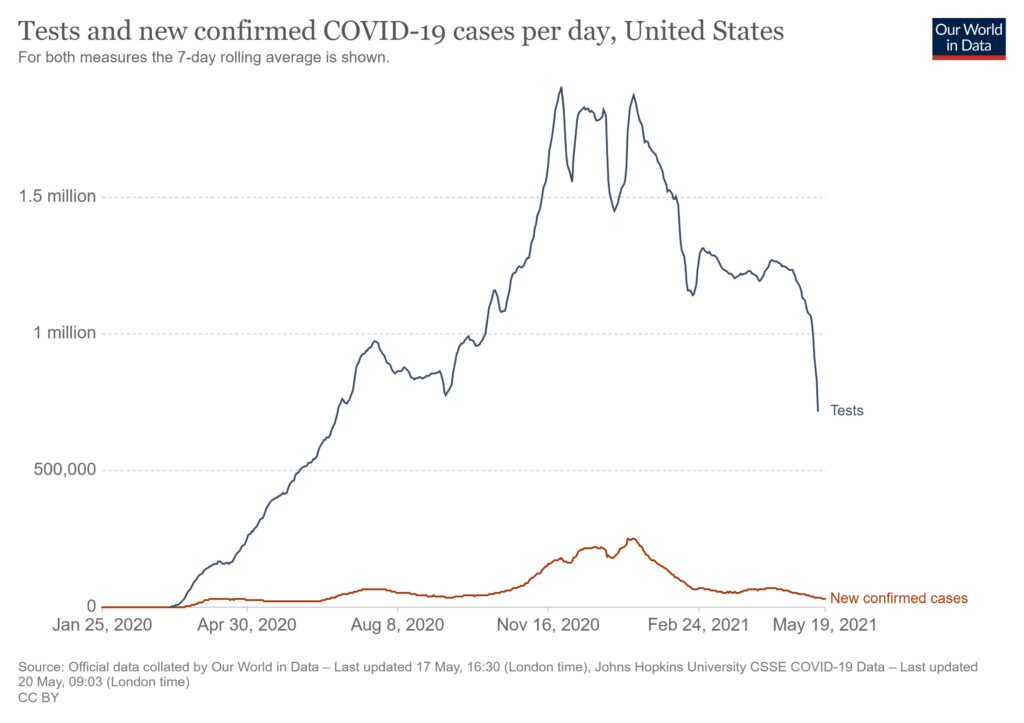
Let’s take a look at some of the latest scientific developments:
- According to a paper published in NBER, there is no evidence that Texas’ reopening this spring led to increased Covid-19 cases or increased foot traffic/economic activity. In other words, reopening did not have any real effect on the economy.
- In a survey released in Japan on Monday, 83% of those polled said they did not want Tokyo to hold the Olympics and Paralympics, which is still scheduled for July 23.
- More than 94% of nursing homes had more than one coronavirus outbreak since the beginning of the pandemic, according to a federal watchdog report. 85% of 13,380 facilities had outbreaks lasting 5 or more weeks.
- New York City’s first Covid-19 surge was fueled by cases circulating in Queens, and to some extent north Brooklyn, before then spreading into Manhattan, according to a new study from an international team of scientists.
- People in Africa who become critically ill from Covid-19 are more likely to die than patients in other parts of the world, according to a recent report published in the medical journal The Lancet.
- According to a CDC report, Covid-19 incidence was 37% lower in schools that required teachers and staff members to wear masks and 39% lower in schools that improved ventilation. This can be coupled with work from Brown University economics professor Emily Oster, who found that higher in-person density is associated with lower student case rates.
- Deaths from Covid-19 and Covid-related causes are likely to be two to three times the number that countries have recorded in their official data, the World Health Organization said on Friday.
This week, vaccination numbers have remained surprisingly stable, in no doubt partially due to the 1.2+ million kids just vaccinated. As I wrote in a Twitter thread on Friday, teens ages 12-15 are now making up 25-30% of the U.S.’ daily vaccinations.
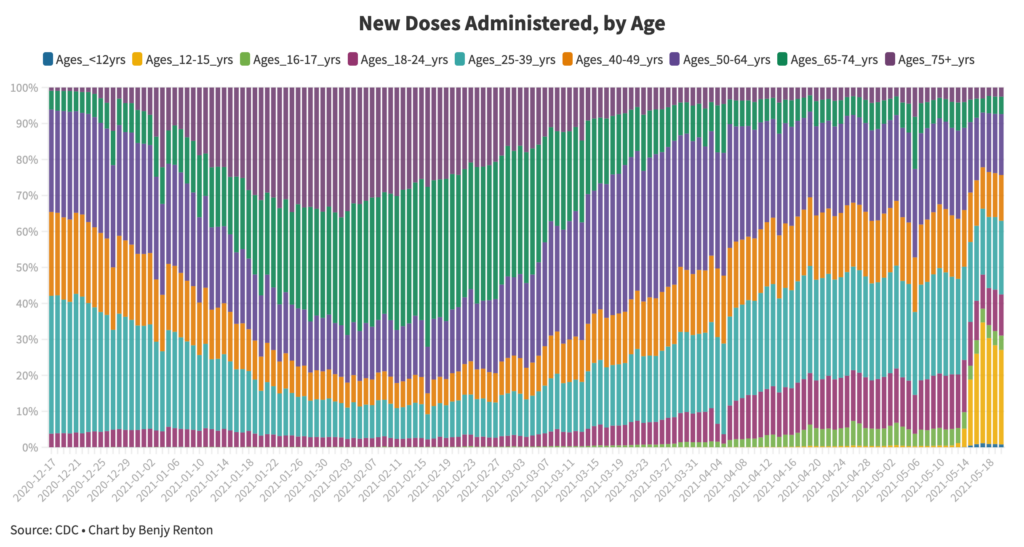
Cases and deaths are down more than 75% since January 1, 2021.
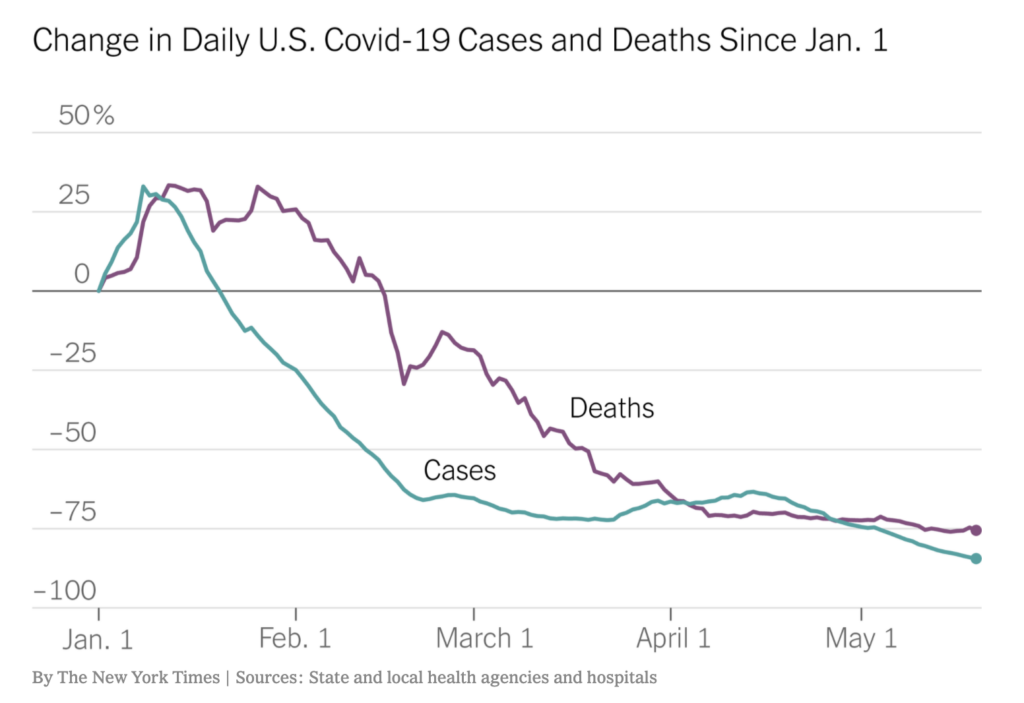
One optimistic trend we are seeing is an uptick in the number of new people receiving their first dose. Some may be due to the authorization in kids ages 12-15, but a fair number of adults have also started vaccination.
Access is still a major issue. According to the most recent Census data, around 19 million million unvaccinated people are willing to get a vaccine and another 15.5 million are unsure. This greatly exceeds those who are unwilling to get the vaccine. Access issues still exceed hesitancy issues.
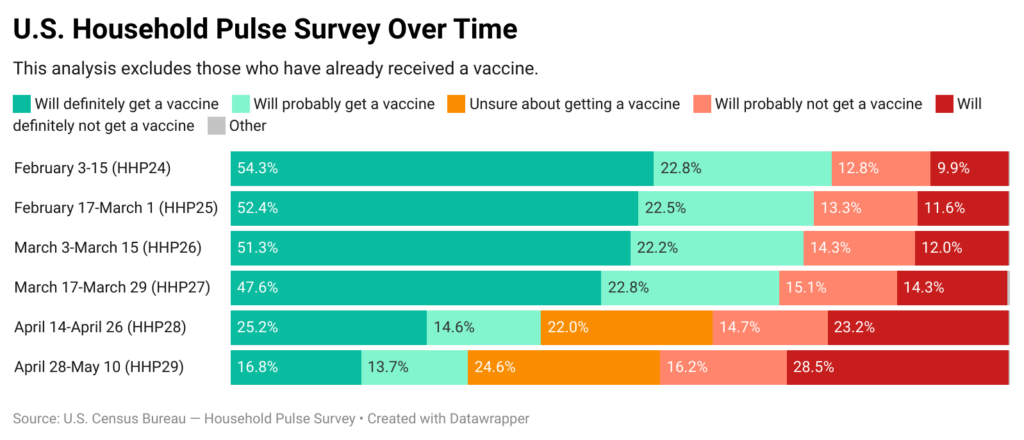
In a piece in The New York Times, Surgo Ventures’ Dr. Sema Sgaier identifies four key subsets of the population experiencing barriers to vaccination: The Covid Skeptics, Cost-Anxious, System Distrusters and the Watchful. There’s not a one-size-fits-all approach — we need different messages for each group.
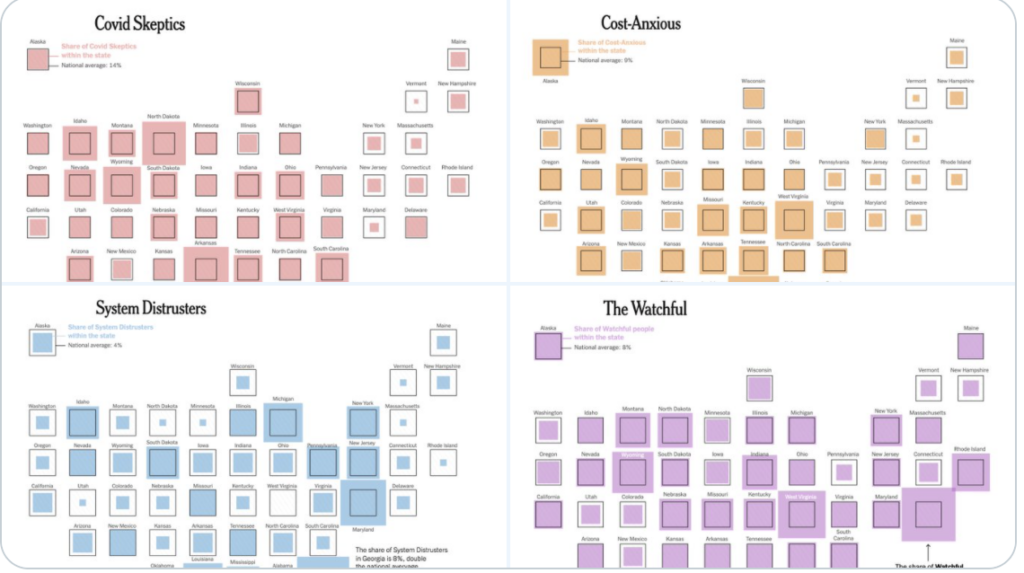
One of the major developments in vaccine logistics this week came from the FDA, which announced that the Pfizer vaccine can now be stored at refrigerator temperatures for up to a month. This was previously set at a maximum of five days. As Dr.Rebecca Weintraub and Dr. John Brownstein write in an ABC piece, this is a game changer for reaching more communities.
A few other updates on vaccines:
- The White House announced a partnership with various dating apps to help encourage vaccination. According to one app, people who display their vaccination status are 14% more likely to get a match. “We have finally found the one thing that makes us all more attractive: a vaccination,” White House adviser Andy Slavitt said.
- According to a CDC report, there is a large disparity in rural county vaccination rates vs. urban counterparts. Vaccination coverage was lower in rural counties (38.9%) than in urban counties (45.7%).
- Last week, Ohio announced its vaccine lottery program. In recent days, vaccinations for residents ages 30 to 74 spiked by 6% after weeks of steady decline. Similar lottery programs have been announced in New York, Maryland and Oregon.
- The CDC is reviewing several dozen reports that teenagers and young adults may have developed myocarditis after vaccination, but we do not yet know if the vaccine caused the condition.
- Vermont has become the first state in the nation to surpass 75% of the eligible population (12+) with at least one vaccine dose. 80% of adults have received at least one dose and 50% of the total population is fully vaccinated. If Vermont was its own country, it would rank second in the world, behind the Seychelles.
- President Biden, heeding widespread calls to step up his response to the pandemic’s surge abroad, said on Monday that his administration would send 20 million doses of federally authorized coronavirus vaccine overseas in June — the first time he has pledged to give away doses that are authorized for use in the United States.
- New data reported by Kaiser Health News found that stark racial disparities in vaccinations persist in many states.
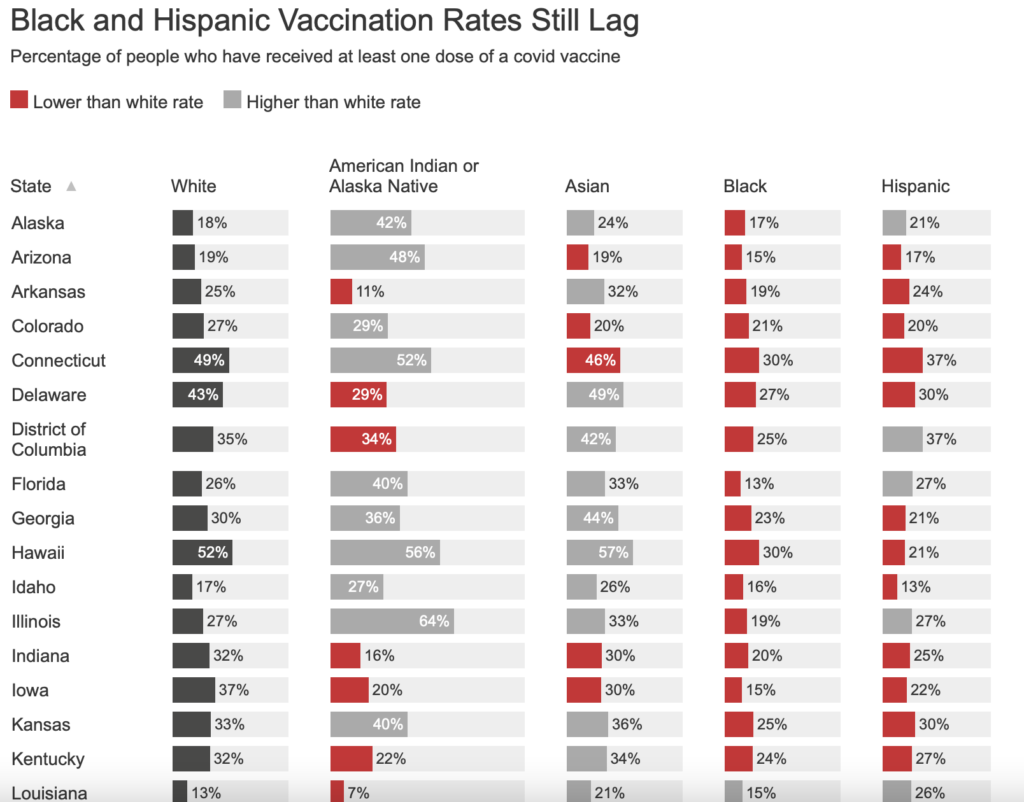
- According to data from nearly 1.2 million Israeli individuals who have received the Pfizer vaccine, the vaccine was 90% effective against infection and 94% against symptoms and had 71% effectiveness against infection in immunosuppressed patients.
- A new Spanish study of ~700 people aged 18-60 found that giving people a first AstraZeneca dose and a second Pfizer dose was safe and effective and actually produced more antibodies than a second AstraZeneca dose. In other words, call it a vaccine Arnold Palmer.
- In the past two weeks, 51% of those vaccinated in the US were people of color. That’s higher than the 40% of the general population these groups represent.
- Mongolia wins the award for fastest vaccination catchup. In one month, the country went from 19% of the population vaccinated with at least one dose to 55%.
- According to a report from the Kaiser Family Foundation, employer actions can help increase access to the vaccine. There are major racial disparities in the workforce and providing paid time off is a major step to increase vaccine access.
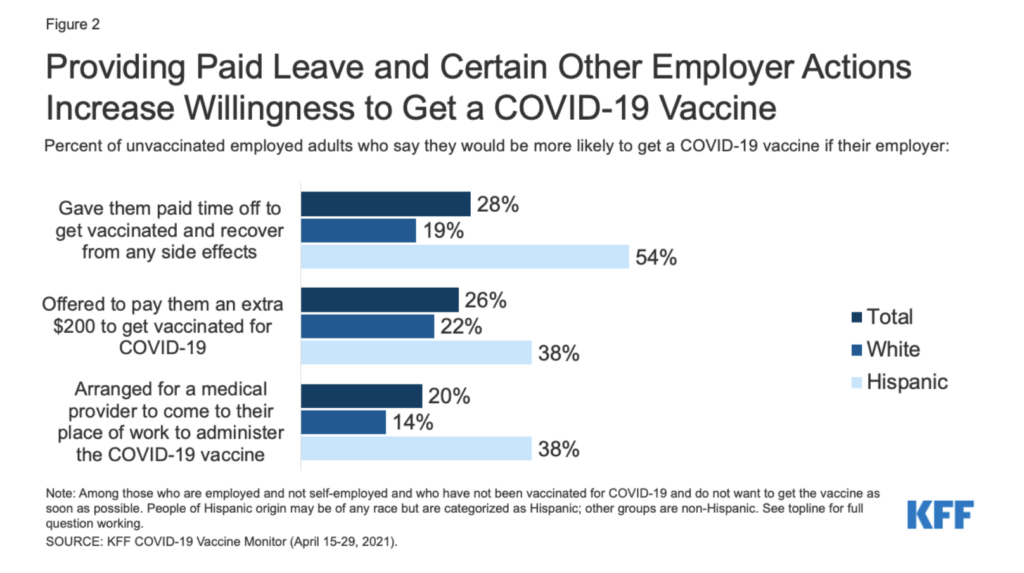
- The U.S. military has seen a 55% jump in Covid-19 vaccinations among active-duty service members over the last month, a senior defense official told CNN.
- In this next phase of the rollout, vaccines need to meet people where they are. Vermont’s Department of Health held a very popular clinic on one of the city’s largest beaches.
- Public Health England has presented the first real-world data on vaccine efficacy against B.1.617.2, the variant first found in India. The efficacy against symptomatic B.1.617.2 was 81% after two doses, much higher than many have thought.
- A district in northern Thailand has launched a raffle campaign for its vaccinated residents to win a live cow per week for the rest of the year.
- A new Washington Post model found that adjusting for vaccinations, the case rate among susceptible, unvaccinated people is 69% higher than the standard figures being publicized. This underscores the point that unvaccinated people are still at great risk of contracting Covid-19.
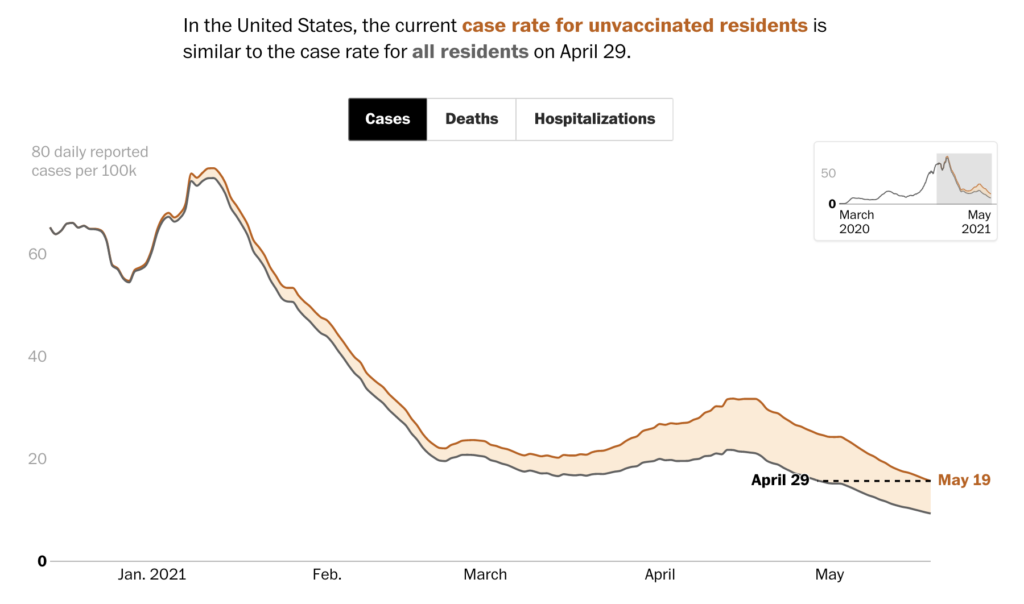
Let’s move on to our discussion of higher education.
Higher education
Here’s a roundup of this week’s higher ed news:
- The University of Texas at Austin has updated its masking policies: “Masks are optional inside university buildings and outdoors. For individuals who are not fully vaccinated or have weakened immune systems, masking and social distancing are optional but recommended.” President Hartzell cites that this announcement is consistent with the governor’s EO and CDC guidance. To be clear, the CDC guidance says people can resume normal activities after being fully vaccinated. This UT-Austin order seems to apply to everyone, vaccinated or not.
- The Chronicle of Higher Education has now identified 404 campuses which have announced requirements for proof of vaccination by the fall, including Indiana University — a public university in a “red” state. According to The New York Times, only 34 — roughly 8% — are in states that voted for the former president in 2020. NBC News reported on how confusing each state’s and college’s rules are.
- Based on HHS testing data, Northeastern University conducted more Covid-19 tests in 2021 than several states.
- Vaccines work. There were zero new cases at Northwestern University this week.
- The total cost of Duke’s Covid-19 mitigation efforts has been around $35 million, according to The Duke Chronicle.
- The New York Times published an interesting story on how Colorado Mesa University functioned as a laboratory for all kinds of campus Covid-19 technologies.
- It’s college graduation season and some ceremonies are quite different than usual. Here’s a photo from University of Maryland student journalist Julia Nikhinson.

The Good Stuff
Let’s roll the clips of the good stuff. In my usual tradition, I feature my favorite stories from the week. Here are my Top 10.
- Brown University School of Public Health Dean Dr. Ashish Jha has become a national celebrity through his media appearances, as seen in a profile in STAT: “More than 200,000 people follow Jha on Twitter, where he replicates his unhurried speech with threads that make liberal use of line breaks, like if William Carlos Williams took to epidemiology.”
- White House health officials laughed as Andy Slavitt announced the new dating apps partnership.
- The Washington Post’s Maura Judkis and Lisa Bonos reported on the hype surrounding “hot vax summer.”
- President Biden took a joy ride in Ford’s new electric F150 Lightning.
- Scarred but resilient, New York City tiptoes toward normalcy.
- Secretary of State Tony Blinken confirms the U.S. does not want to buy Greenland after the former president’s proposal.
- Have you ever wondered about the life cycle of a cicada? The Washington Post has you covered.
- Vermont has built a nation-leading vaccination campaign through the hard work of many public health workers and vaccinators.
- So you want to work in epidemiology? Australian epidemiologist Dr. Gideon Meyerowitz-Katz published an intro guide to the field.
- Here’s to the happy family and friend reunions in the weeks and months to come.
Conclusion
58 weeks later, we’ve been through a lot together. Thank you for your continued support and readership throughout this pandemic. While the pandemic is far from over, America has finally turned multiple corners with life-saving vaccines. Our main priorities should be to increase vaccine access domestically and contribute doses internationally. And as we begin to gather again, we cannot lose sight of the 589,223+ Americans we tragically lost up until this point. May they rest in peace and may their memories be a blessing.
For the last time in this format, my best to all for good health.
For more instant updates, follow me on Twitter @bhrenton.
